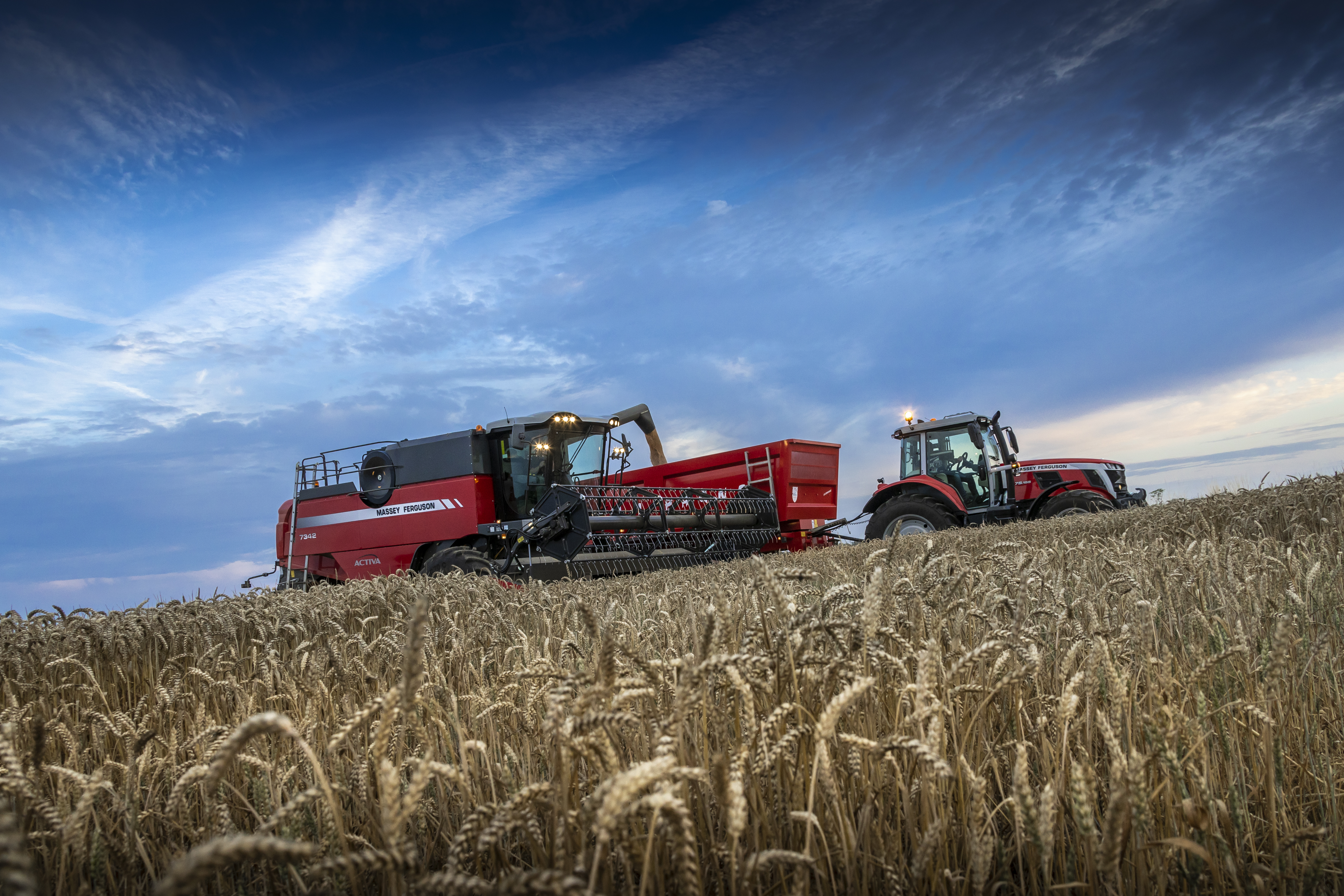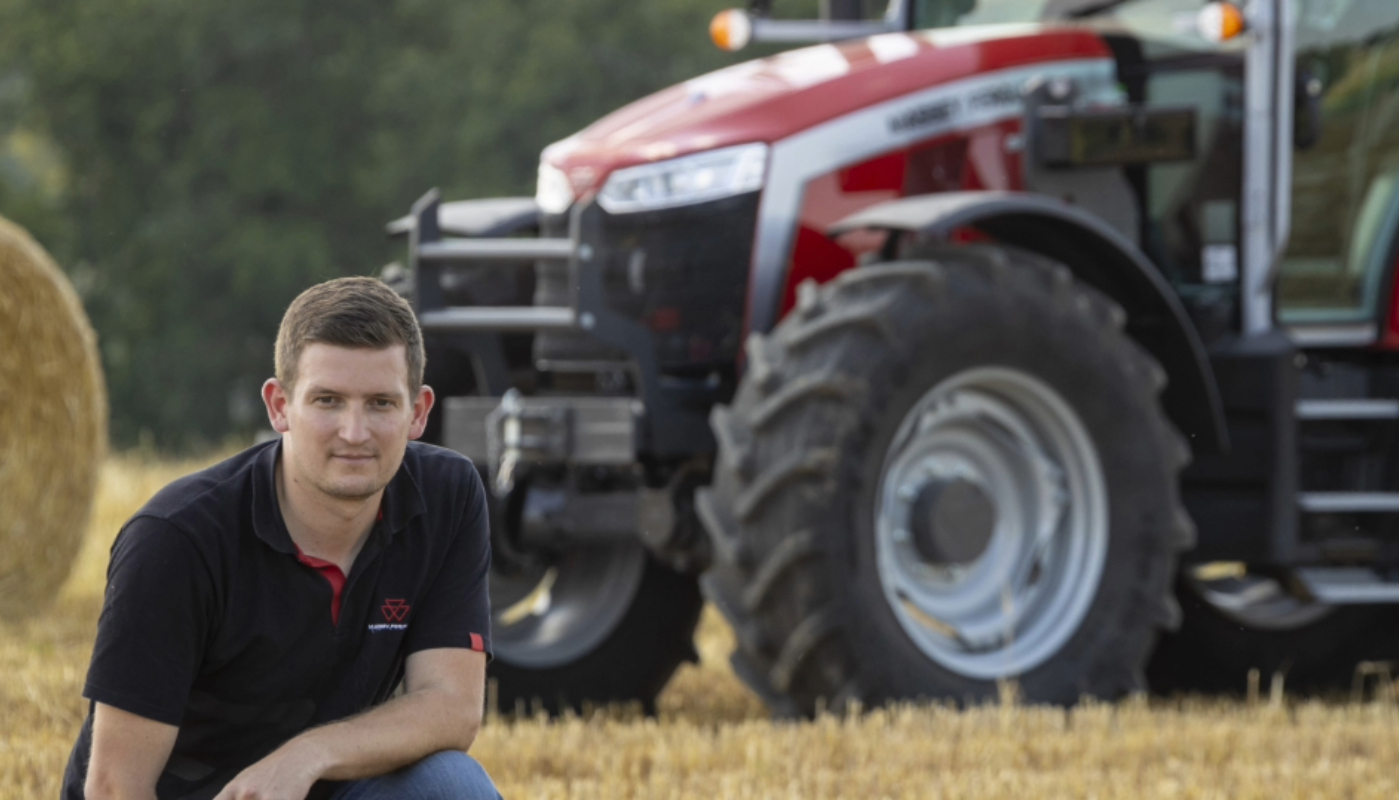This horse boarder and hay grower has some unique urban farming challenges, but experience and equipment help him get the job done.
It’s early morning at Hidden Acres Farm in Nashville, Tennessee, and Nathan Mills and his son Marshall are throwing hay. “We’re doing it the old-fashioned way,” he laughs, clearing a trailer and stacking tight square bales in the hay barn. One building over, a few boarders are showing up to ride, jump or just visit their horses.
“That’s what we do here these days,” says Nathan. “We board horses for other folks. Their pets. Their babies.” An outdoor riding arena is just beside the horse barn, and one of Hidden Acres’ boarders is setting up jumps for a morning run. “The horse is the easy part,” says Nathan. “We’re in the people-pleasing business. They know that their horse is in good hands.”

No doubt about that. Nathan spent the first 30 years of his life raising Tennessee Walking horses with his grandfather, Hoyte Eakes, something of a legend in the horse community. “We raised seven World Grand Champions on this place,” Nathan says, and he’s raising Marshall to appreciate the legacy.
“I’m the stable boy,” Marshall says, with a broad smile that matches his father’s. The two clearly have fun doing the work, and Marshall knows how special his position is in the Hidden Acres lineage. “I get paid by having a good life here on the farm,” he says.

The horses at Hidden Acres have a good life, too. There are about 25 boarders right now, and every horse stays “fat, happy, and slick,” says Nathan. His smile stays broad as he says it, but feeding is serious business for a horse boarder. Nathan realized this as he took over the farm and decided to take hay matters into his own hands. “I would spend all these evenings out in the field cutting grass and thinking, ‘Why do we buy hay?’ We could do our own,” he says.
He began by cutting and baling 35 acres on his place, and then by looking for other places to cut locally. “We are in the city,” says Nathan, so good ground is at a premium. He’s now cutting some 565 acres at three locations, but he’s not sowing a single blade.
Quality Hay Comes Naturally
“Here in Middle Tennessee,” he says, “we’re so fortunate to have really good quality grass.” It’s a mixed native grass that’s primarily fescue along with some crabgrass and lespedeza. Depending on the time of the cutting, there may be volunteer orchardgrass, barley, or a little timothy, Nathan says. And while he does fertilize and do some spraying for weeds, “Mother Nature gives us the hay. I never sow. I never drill. That’s just foreign to me.”
While he does use his own hay for feeding boarders, the vast majority of what he and Marshall put up is for sale. And the father-son team know what horse owners want. “The customer is buying the hay, not the horse,” says Nathan. “’Horse-quality hay,’ in my opinion, is a term that gets thrown around a lot. Honestly, it should be called ‘horse-owner quality.’”
Mills’ Tips for Quality Hay from Native Grasses
Mills has cut hay for feed and sale most of his life, and is teaching son Marshall to do the same. He and Marshall offer a few tips for cutting and baling native grasses that have made for a successful hay business and help keep their boarders happy, too.
1. Cut at night, dry by day
“My main reason for cutting at night is time management,” says Nathan, who is a one-man operation and needs to get the most out of hay-making season. “You want to spend your daytime hours drying, not cutting.”
2. Give baler time to process
The Mills’ equipment is perfectly capable of moving quickly through the field, but “taking it slow with the baler is key,” says Nathan. “Give your baler plenty of time to process the windrow comfortably, and it will make a tighter, more smooth, beautiful, compact bale,” he says. And that, in turn, helps solve one of urban farming’s logistical challenges. “Every bale I make has to hit the road at some point,” Nathan says, so stacking tighter on the trailer gives him more confidence to move through Nashville traffic. Plus, no matter where you’re moving hay, nobody likes to lose hay on the road.
3. Cut native grasses when they’re softer
“It’s really good feed quality, especially when it’s cut young,” says Nathan. Plus, the grass is just naturally softer and easier to handle when it’s less mature. While you get more cuttings by mowing young, Nathan does acknowledge there’s less volume for each cutting, “but you’re gonna have better quality with your product,” he says.
4. Get the right baler
“The inline design is by far the best,” says Nathan. “Massey (Ferguson) makes the best baler money can buy.”

“The (Massey Ferguson) 1800 Series baler is crucial to making a perfect bale,” he says. “Every bale, every time, it’s so consistent.” That’s important for transport, getting a good, tight load for the road. “Every bale I make has to hit the road at some point,” Nathan says. “You cannot lose hay on the road.”
The consistency also pleases his clientele, who are buying square bales mostly for pet horses. Besides consistency of shape and weight, the 1800 makes consistent flakes as well, and Nathan runs the baler at a speed that yields 16 flakes per bale. “Bales that flake apart easy, and a consistent number of flakes, makes the bale easier to portion out,” he says, so customers know how to plan for feeding with the hay they buy from Nathan.
The baler is practical for Nathan in the field as well. “It burns me up to leave hay in the field,” says Nathan, “so I like that the 1800 can eat some hay! The wide pickup is very important to me.”
Marshall agrees. “You use an inline baler, your bales are gonna be a lot tighter, a lot better quality,” he says.
A Legacy with Massey Ferguson
“I’ve never considered anything other than Massey Ferguson,” says Nathan, recalling that when he was growing up, he ran the 165 and 175 models and knew they were built to last. They were so durable, in fact, “my grandfather would not buy a new tractor,” he laughs. “I always said, when I run this place, I’m buying a new tractor.”
That leads to a long line of Massey Ferguson tractor purchases, including several that are still operating on the farm now: the MF 583, 2615, 2605H, along with a 4710 that runs the 1800 square baler and a DM 306-P disc mower.
The 4710 and the 1800 work together “like butter,” he says. “The 4710 has more than enough power to run that baler smooth and easy.” Loading hay is a breeze, he says, switching from forward to reverse “with just a finger… Loading bales in the field, on the trailer, when it takes a lot of finesse and intricate movements… that transmission is key.”
Mills works with Cleburne Farm Supply in Columbia, Tennessee. “Cleburne Farm Supply to me is like Cooter to the Duke boys,” he laughs, referencing the constant companion character from the 1980s series “The Dukes of Hazzard.” “I wouldn’t consider using anyone else. I call them up, boom, I’ve got help.”
The Urban Farming Challenge
Nathan says his location keeps him close to the kinds of horse owners that buy his hay and need boarding services, but moving farm equipment and hay around Nashville can be a challenge. “You gotta learn where you can go through places in rush hour,” he says, but his equipment purchases have helped make things easier. “Logistics-wise, those tight bales will stack well on a trailer. You don’t have to worry about losing bales off the trailer, going down the road.”
The location of Hidden Acres Farm, in the heart of Nashville, also made it near ground zero for two infamous weather events: the generational flood of 2010 that notoriously flooded downtown and along the Cumberland River to the revered Grand Ole Opry and Opryland property, and the March 2020 tornado that blew out windows in downtown skyscrapers and appeared to level the horse barn at the farm. “But we have block stalls,” says Nathan. “Always have block stalls.” In spite of the roof being completely destroyed, not a single animal was lost in the tornado. Nathan recalls hundreds of volunteers showing up for both events, but chuckles a bit when remembering the flood cleanup, difficult as it was. “Floods and farms don’t mix,” he says, telling stories of snake tracks left in the mud as the flood waters quickly receded.
“But this is home,” he says of the farm, and Nashville. “I hope to be here the rest of my days. I hope my son wants to continue what we do here for the rest of his.” On cue, Marshall says he wants to be a World Grand Champion like his father.























Share